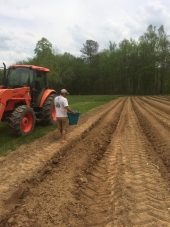




 1
1




 You might enjoy reading "On Good Land" by Michael Ableman, who ended up doing something similar to what you envision on a suburban farm in California. I find the book extremely inspiring.
You might enjoy reading "On Good Land" by Michael Ableman, who ended up doing something similar to what you envision on a suburban farm in California. I find the book extremely inspiring.  I don't think Ableman designed for clients, though, he made his off-farm income from writing and speaking.
I don't think Ableman designed for clients, though, he made his off-farm income from writing and speaking.
Idle dreamer
 1
1




 1
1





 1
1





 2
2




 1
1




Landscape Architecture is a pretty cut-throat field to get your start in. I did a lot of reading on it when I was choosing a major as well and decided that it looked a lot like law when you're trying to land your first job. Quite frankly, no matter how you look at it, unless you are paying for your education as you go, you will have to plan on working in a firm or for someone for a few years to pay back student loans.
Designs and Consulting @ http://www.barrettecological.com // Blogging @ http://www.permacultureforrenters.com //
Portland area events @ http://www.pdxpermaculture.com
 1
1








Leonard Barrett wrote:If your primary interest is this managing a farmstead thing...you probably don't want to have that much debt...and probably don't need an LA degree/license. If you're managing a prominent demonstration site, and there are lots of folks coming through, that'll probably bring in enough design work in-and-of-itself.
 can you tell I'm super indecisive??), and start getting some hands on experience woofing, interning at farms, etc. From my previous 4 years of collegiate education which was never completed, I likely have enough credits to get some sort of a liberal arts degree in a very short amount of time, and maybe while I'm here at rutgers, I can tag on the minor in agroecology like I am planning on doing anyway.
can you tell I'm super indecisive??), and start getting some hands on experience woofing, interning at farms, etc. From my previous 4 years of collegiate education which was never completed, I likely have enough credits to get some sort of a liberal arts degree in a very short amount of time, and maybe while I'm here at rutgers, I can tag on the minor in agroecology like I am planning on doing anyway.
 1
1








 1
1





 1
1




Rob Meyer wrote:if anyone has any tips on improving public speaking, aside from taking a public speaking class which didn't help at all...

Kevin's offshoot of PEX: http://uhspr.ca/merit-badges/




The Dirt Surgeon wrote:Otherwise, save a few grand, buy a place in South Dakota, and give the finger to civilization.

 1
1




Paul Cereghino- Ecosystem Guild
Maritime Temperate Coniferous Rainforest - Mild Wet Winter, Dry Summer
























http://www.northeastedible.com









http://www.northeastedible.com












 Again, just my opinion (an uneducated person in many peoples eyes)
Again, just my opinion (an uneducated person in many peoples eyes)



Dale Hodgins wrote:I would truly like to be dictator of the Americas, but my chances are so slim, that it's not something I lose much sleep over.













Ajila Ama Farm Western North Carolina
www.facebook.com/ajilaama









|
Why am I so drawn to cherry pie? I can't seem to stop. Save me tiny ad!
The new purple deck of permaculture playing cards
https://www.kickstarter.com/projects/paulwheaton/garden-cards
|





